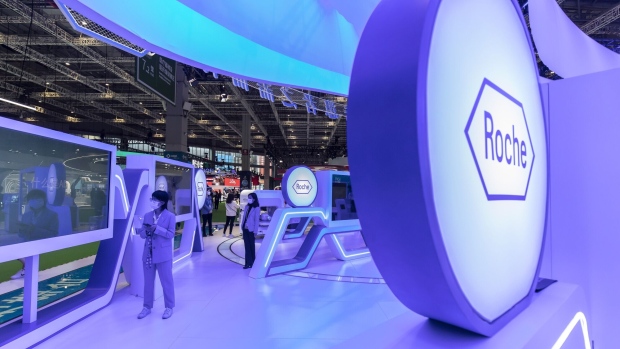Oct 23, 2023
Roche Agrees to $7.1 Billion Deal for Telavant to Boost Pipeline
, Bloomberg News

(Bloomberg) -- Roche Holding AG will pay $7.1 billion to acquire Telavant Holdings Inc., a developer of a promising therapy for treating inflammatory bowel disease, in a bid to shore up its pipeline of experimental medicines.
The Swiss pharmaceutical company said Monday it will gain rights in the US and Japan to develop and market the drug known as RVT-3101. Roche will also provide a near-term milestone payment of $150 million.
The antibody therapy developed by Telavant, which is owned by Roivant Sciences Ltd. and Pfizer Inc., targets both inflammation and fibrosis, giving it the potential to be applied in multiple other diseases, Roche said. The drug, which can be delivered at home via injection, has shown it can be used safely by patients in clinical trials so far.
The deal is the company’s largest acquisition since buying InterMune Inc. in 2014. Roche has come under pressure to improve its pipeline with medicines it can commercialize soon as a windfall of revenue from products used in the Covid-19 pandemic comes to an end. The drugmaker said it will start a global third-phase trial for RVT-3101 as soon as possible.
Roche remains on the hunt for “best-in-portfolio” deals, both late- and early-stage assets, Teresa Graham, chief of Roche’s pharmaceutical unit, said in an interview. “From the perspective of wanting to go out there and find the best possible science, I think this is absolutely the kind of deal you can expect us to do more of.”
Inflammatory bowel disease is a group of chronic gastrointestinal disorders that affects almost 8 million people worldwide and most of them, some 80%, cannot find lasting treatments. Roivant sees a $15 billion market for inflammatory bowel disease in the US alone, according to an investor presentation in January.
“It’s a terribly debilitating disease just from a quality of life perspective,” said Graham. “If you talk to patient groups, they’ll tell you the most common thing people have on their phones is a bathroom finder, because they just can’t be out of reach of a bathroom.”
Shares of the Swiss drugmaker fell as much as 0.7% Monday morning. The stock plunged last week after the company didn’t upgrade its financial targets and reported declining quarterly revenue.
Read More: Roche Disappoints With Cautious Forecast as Quarterly Sales Drop
“We’ve been of the mindset that Roche was more likely than not to do a bolt-on deal, rather than something transformative,” wrote Barclays analyst Emily Field. “The real question is, is this enough to improve sentiment? It’s a start, but we think investors want to see more out of Roche’s internal pipeline as well.”
What Bloomberg Intelligence Says:
“The price tag looks high given it represents just US and Japan rights to the drug in a field where the Swiss company has limited experience. The asset has shown higher rates of remission in Phase 2 inflammatory bowel-disease trials compared to other recently acquired assets.” — John Murphy, BI pharma analyst
Roche Pays Up for Telavant to Join Merck, Sanofi in TL1A: React
Chief Executive Officer Thomas Schinecker faces a two-pronged challenge: the loss of billions of dollars of pandemic-linked revenue at the same time that some clinical trial stumbles have left many investors questioning the company’s ability to deliver on its highest-profile projects.
Read More: A $900 Million Share Sale Tests One of World’s Richest Families
RVT-3101 is an antibody that works by blocking a protein called TL1A that’s thought to play a role in autoimmune disease. Interest in the drug class has risen sharply since Merck & Co. edged out competitors, including AbbVie Inc. and Bristol-Myers Squibb Co., in April to buy Prometheus Biosciences Inc. for $10.8 billion, primarily for its IBD treatment, which is expected to generate billions of dollars in revenue.
Telavant was formed in 2022 specifically to develop and commercialize RVT-3101 in the US and Japan. Roivant owns 75% of Telavant and Pfizer owns the rest.
Roivant attracted interest from several large drug companies wanting to purchase a mid-stage drug in the potentially lucrative immunology treatment area. Sanofi agreed earlier this month to pay Teva Pharmaceutical Industries Inc. as much as $1.5 billion to help develop and sell its experimental medicine for inflammatory bowel disease.
Roivant released data at the end of June showing that its treatment was more effective than previously thought.
--With assistance from Lisa Pham and Allegra Catelli.
(Updates shares. A previous version of this story was corrected to fix the spelling of Telavant)
©2023 Bloomberg L.P.


